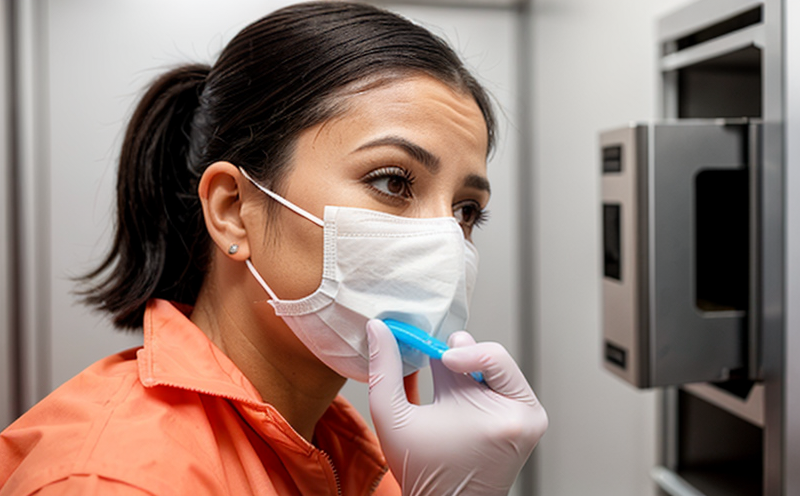Surface swab hygiene inspection
The surface swab hygiene inspection is a critical procedure used to ensure compliance with food safety and hygienic standards in various industries, particularly those dealing with food production. This method involves collecting samples from surfaces using sterile swabs, which are then analyzed for the presence of bacteria, fungi, or other indicators of contamination. The primary objective is to identify potential sources of cross-contamination that could compromise product quality and safety.
The procedure adheres strictly to international standards such as ISO 16817:2014 and ASTM E2315-19, which dictate the sampling methods and laboratory procedures for microbial analysis. Compliance with these guidelines ensures consistency and reliability in results across different laboratories and jurisdictions.
Quality managers and compliance officers rely on surface swab hygiene inspections to monitor cleanliness levels within their facilities. By regularly performing this test, they can preemptively address any issues before they escalate into major problems that could affect the reputation of the brand or lead to product recalls. This proactive approach also enhances consumer confidence in the safety and quality of the products being offered.
R&D engineers benefit from surface swab hygiene inspections by gaining insights into how different materials interact with microorganisms under various environmental conditions. These tests are instrumental in developing new packaging solutions that offer improved protection against contamination, thereby extending shelf life and maintaining product integrity.
For procurement teams, ensuring suppliers meet the required standards through regular audits is paramount. Surface swab hygiene inspections serve as an essential tool during these assessments, helping to verify that all incoming raw materials are free from harmful pathogens before they enter the production process.
Industry Applications
| Industry | Application |
|---|---|
| Food and Beverage | Monitoring cleanliness in processing areas, packaging lines, and storage facilities. |
| Pharmaceuticals | Assuring sterility of manufacturing environments and equipment. |
| Biotechnology | Evaluating contamination risks in bioreactors and laboratory spaces. |
| Hospitality | Verifying hygiene standards in kitchens, dining areas, and guest rooms. |
The surface swab hygiene inspection plays a pivotal role across multiple sectors where maintaining high levels of cleanliness is non-negotiable. In the food and beverage industry, for instance, it helps prevent cross-contamination between different products or batches. For pharmaceutical manufacturers, ensuring sterility during production ensures that medications remain safe and effective throughout their lifecycle.
Similarly, in biotechnology labs, this test aids in identifying potential contamination hotspots early on, allowing for corrective actions to be taken promptly. Within the hospitality sector, regular testing can help maintain a pristine environment that meets regulatory requirements and customer expectations alike.
Eurolab Advantages
At Eurolab, we offer a comprehensive suite of surface swab hygiene inspection services tailored specifically to meet the rigorous demands of our clients. Our expertise lies in providing accurate, reliable results that contribute significantly towards maintaining food safety and hygiene standards.
- Comprehensive Sampling Techniques: Utilizing advanced techniques ensures precise sampling from even hard-to-reach areas.
- State-of-the-Art Laboratory Facilities: Equipped with the latest technology, our labs deliver rapid turnaround times without compromising accuracy.
- Experienced Technicians: Our team comprises highly trained professionals who understand the nuances of each industry they serve.
- Compliance with International Standards: Ensuring all tests adhere to recognized standards like ISO 16817:2014 and ASTM E2315-19 guarantees consistency in results.
By choosing Eurolab for your surface swab hygiene inspections, you gain access to a wealth of knowledge and experience that can help you stay ahead of regulatory changes and industry trends. Our commitment to excellence ensures that every test conducted is not just effective but also efficient, saving time and resources while enhancing overall operational performance.
Competitive Advantage and Market Impact
- Preemptive Risk Management: Identifying contamination risks early allows for targeted interventions, reducing the likelihood of costly recalls.
- Enhanced Consumer Trust: Demonstrating a commitment to food safety through regular hygiene inspections builds trust among consumers and stakeholders alike.
- Improved Product Quality: Consistent adherence to strict hygiene standards translates into better product quality, which is crucial for maintaining competitive edge in the market.
- Informed Decision Making: Regular testing provides valuable data that can inform strategic decisions regarding facility upgrades or process improvements.
The surface swab hygiene inspection serves as a cornerstone of any robust food safety program. By integrating this service into your operations, you demonstrate a proactive stance towards ensuring product quality and safety, which is increasingly important in today’s competitive market environment.





